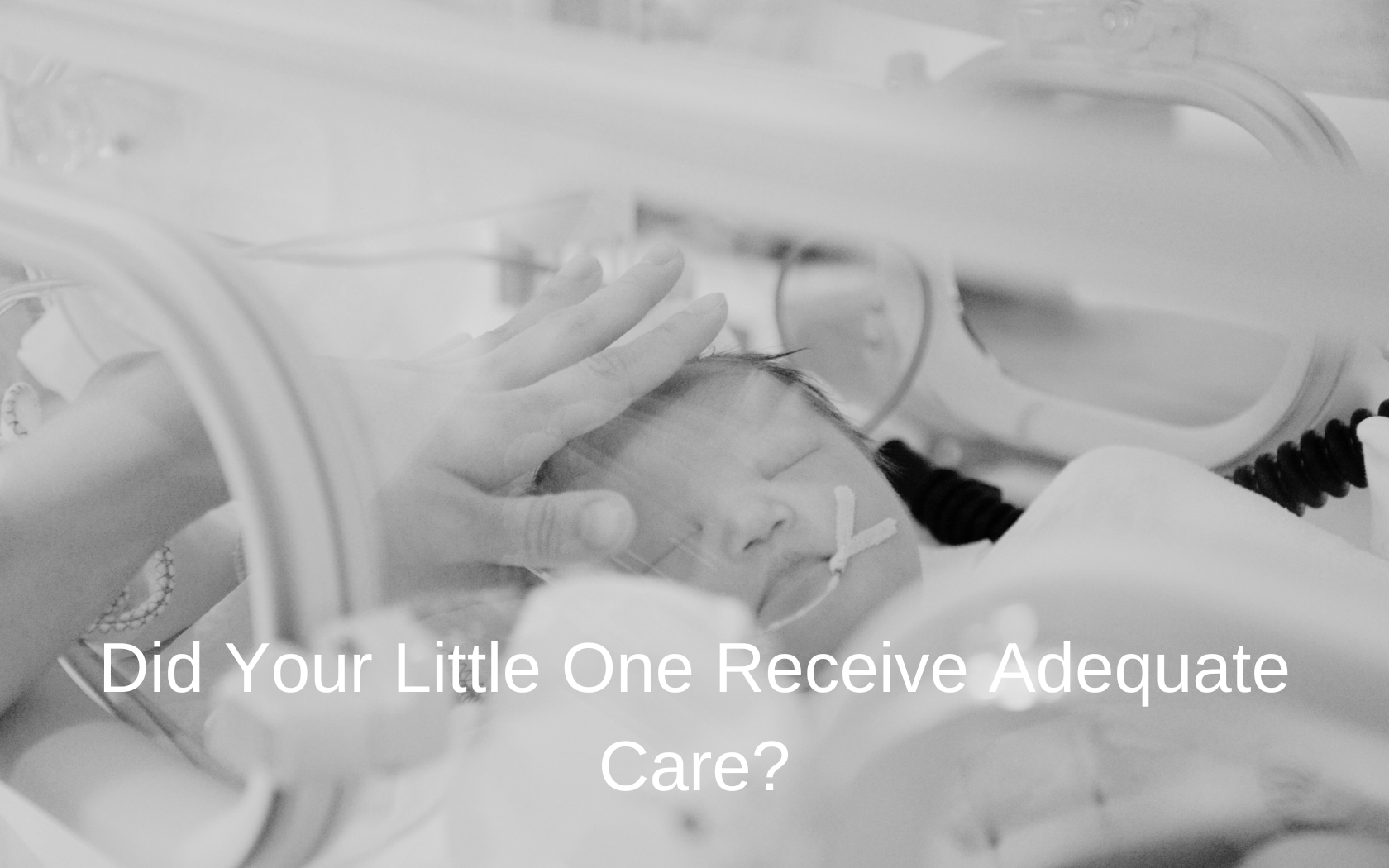When doctors diagnosed Betsy’s son Max with neonatal encephalopathy, she felt the walls closing in on her. As she stared at her baby’s tiny swollen face, she was overwhelmed with worry. What would Max’s life be like if he pulled through? Would it be a life full of suffering and pain?
Fortunately for Max and his family, doctors were swift to act when they spotted signs of NE. He not only survived, but thrived. Today he’s in 4th grade and doing well at school, despite living with mild cerebral palsy and a mild vision impairment.
Swift action is the key with birth injuries like NE. When doctors treat it early, babies have a much better chance of surviving and thriving. But failure to diagnose and treat NE can constitute medical malpractice. If you suspect malpractice played a part in your child’s NE, contact a neonatal encephalopathy lawyer now.
In this article, we’ll explore:
- What neonatal encephalopathy is
- How often NE occurs in babies
- How NE and HIE are related
- Symptoms of NE
- Prognosis for babies with NE
- NE treatment options
- Legal Help for NE lawsuits
- How to hire a neonatal encephalopathy lawyer

What is Neonatal Encephalopathy?
Neonatal encephalopathy (NE) is a broad term that means a baby’s brain isn’t functioning well. Neonatal means “newborn,” and encephalopathy means there’s something wrong with the brain.
NE affects the brain and central nervous system, so it changes how a baby moves and responds to the world around them. It’s like when your computer has a glitch and starts doing odd things. Babies with NE might have trouble moving their arms or legs. They can be extra sleepy and fail to react to stimuli the way they should.
How Common is Neonatal Encephalopathy?
NE occurs in about 3 in 1000 live births. But the exact estimate varies somewhere between 2 and 9 births, because doctors often use other terms like “birth asphyxia” to describe NE.
What Causes NE?
The most common cause of NE is birth asphyxia. This means the baby’s brain doesn’t get enough oxygen at some point during pregnancy or birth.
Other causes of NE may include:
- Infection
- Stroke
- Bleeding in the brain
- A genetic or metabolic disorder
- Meningoencephalitis (encephalitis with meningitis)
- A congenital brain malformation
Sometimes a doctor’s negligence can cause NE. In fact, hypoxic-ischemic encephalopathy is the most common birth injury claim.
Cases involving brain injuries often result in large payouts. This is because children with severe brain damage often need expensive care and lifelong treatment.
Parents of children with NE can sue for the cost of treatment with the help of a neonatal encephalopathy lawyer. These are attorneys who have specific training and knowledge to help them handle lawsuits that deal with NE and other birth injuries.

Are Neonatal Encephalopathy and Hypoxic ischemic encephalopathy (HIE) the Same?
Doctors sometimes use HIE and NE interchangeably. But they’re not exactly the same thing. HIE is a specific type of encephalopathy. It results from a lack of oxygen (hypoxia) and reduced blood flow (ischemia) to the baby’s brain during or around the time of birth.
NE is an umbrella term. It includes encephalopathy cases that are caused by factors other than lack of oxygen. Neonatal encephalopathy can be:
- Metabolic (caused by abnormal chemical reactions or disturbances in the body’s metabolic processes)
- Septic (caused by infections)
- Thromboembolic (related to blood clots)
- Genetic (passed down by family)
Symptoms of Neonatal Encephalopathy
The symptoms of NE depend on its severity. They include, but aren’t limited to:
- Abnormal muscle tone (either too stiff or too floppy)
- Difficulty breathing or irregular breathing
- Seizures or twitching movements
- Lethargy or extreme sleepiness
- Poor feeding or sucking reflex
- Weak or absent reflexes
- Abnormal eye movements
- High-pitched crying or unusual crying patterns
- Altered level of consciousness or responsiveness
- Delayed or absent developmental milestones
- Apnea (the baby stops breathing for 20 or more seconds)
Every case of NE is different. Sometimes the symptoms don’t show up until later. But there’s one unmistakable symptom doctors can’t miss: seizures. They are one of the most common symptoms of NE. But they’re not the type of seizures you might be thinking of, where the person shakes like a ragdoll. Babies with seizures stare into space, or twitch their arms or legs.
What is the Prognosis for Babies with NE?
Neonatal encephalopathy is one of those medical conditions where every second counts. If doctors recognize and diagnose it right away, the baby will have a much better chance of ending up with no permanent brain damage.
On the other hand, severe cases of NE have long-term effects, and there’s no way around it. Severe brain damage can’t be reversed. But prompt treatment can help lessen the symptoms. Baby’s brains are flexible. So even if there’s an injury, it doesn’t define a baby’s potential.
Survival Rate for Neonatal Encephalopathy
One study followed babies with NE until they were three years old. These babies received cooling therapy treatment right after birth. Here’s what the study found:
- All the babies with mild NE survived up to age 3.
- 13 babies with moderate NE died (4.5%). 44 of them (15.8%) developed major disabilities.
- 32% of the babies with severe NE died before age 3. 82.0% had major disabilities.
Treatment for Neonatal Encephalopathy
Doctors create a personalized treatment plan based on a baby’s specific needs. Treatment for NE may include:
- Monitoring and observation
- Cooling therapy (therapeutic hypothermia)
- Seizure medication
- Breathing support from oxygen masks or machines
- Feeding support
- Physical therapy
- Occupational therapy
The goal of NE treatment isn’t to reverse brain damage. That’s impossible. But it can prevent further brain damage and improve brain function.
NE and Medical Malpractice
When doctors hand down a diagnosis of neonatal encephalopathy, a parent’s first thought might be: “What went wrong?”
It’s possible that somewhere down the line, a doctor or nurse was negligent. Their negligence could be the direct cause of NE.
Here’s how that could happen:
- Failing to recognize warning signs that indicate the baby is not getting enough oxygen.
- Medical team fails to respond to fetal distress during labor.
- A doctor misdiagnoses infections or metabolic disorders that can lead to NE.
- A baby needs resuscitation, but the medical team doesn’t provide it right away.
- A surgeon makes an error during a C-section that injures the baby’s brain.
- Untreated infections get out of hand during pregnancy and cause NE
- The medical team gives the wrong medication or the wrong dosage of medication.
Proving a doctor’s negligence as the direct cause of NE can be complex. It requires a thorough investigation by legal and medical experts. This is why families should consult with a lawyer if they have a suspicion of wrongdoing. But not just any lawyer will do. They need a neonatal encephalopathy lawyer.

What is a Neonatal Encephalopathy Lawyer?
A neonatal encephalopathy lawyer is a birth injury lawyer with expertise in malpractice cases involving NE. This is the best type of attorney to work with when you’re trying to hold doctors or a hospital accountable for mistakes involving NE.
Keep in mind that many law firms say they take on birth injury cases among other types. But you want one that specializes in birth injuries. After all, you wouldn’t go to a general doctor when you have a complicated heart issue that requires a specialist.
If your child has NE, and you suspect foul play, consider contacting a neonatal encephalopathy lawyer on Hampton & King’s legal team. Our experts will review your case for free.




